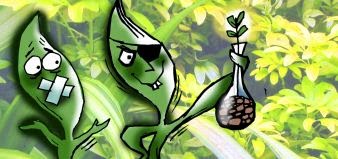Biopiracy: Historically and Today
http://sites.duke.edu/amazonbiopiracy/policy-issues/
As described in the video below, biopiracy is the
exploitation of biological material, or knowledge of that biological material,
for external commercial profit, without appropriate compensation to the
indigenous people. Both historically and today, developed countries have been
exploiting the knowledge and resources of indigenous peoples’ plant products
for their own monetary gains.
 |
| http://www.alchemiststea.co.uk/tea-transfer-from-china-to-india.htm |
One such example of biopiracy in history is the
East India Company’s illicit transplant of tea from China to India. Through the beginning of the nineteenth
century, China had been the world’s top exporter of tea, perhaps its most
popular native product on the market.
However, the British East India Company then decided it wanted to share
in the great wealth of the tea industry, so in 1848, Robert Fortune began his
journey to smuggle tea seeds from China to India. Disguising himself as a Chinese man, Fortune stole
over 20,000 tea plants and seeds and shipped them to new Indian tea plantations. By 1890, Britain imported 90% of its tea from
its Indian colony, robbing the Chinese of one of their top selling indigenous
plants.
Around the same time, Britain also smuggled quinine from its native home in Brazil to British plantations in Sri Lanka,
Singapore and South East Asia. At the
time, the British had a great need for quinine, the only known cure for malaria
and yellow fever. Brazilians were the
only ones in the world to sell this invaluable product, found naturally in
their local cinchona trees. However, in
1860, Englishman Clements Markham smuggled cinchona seeds and distributed them
throughout the British empire, taking control of world quinine production. Thus, once again, the capitalists from the
developed world dwarfed the locally-run, indigenous markets.
http://simbahayan.tripod.com/B5-biopiracy01.html
Sadly, biopiracy
still pervades our world today. In 1997,
an American company, RiceTec, Inc. was granted a US patent to exclusively sell
“Basmati” rice, a crop that had played a huge role in Indian and Pakistani
cuisine and culture for thousands of years.
Consequently, the indigenous peoples were required by law to pay
royalties to RiceTec whenever they sold their own traditional product by the
name, “Basmati,” even though they and their ancestors had referred to the rice
as Basmati for as long as they had produced it.
In 2001, organizations around the world rebelled, succeeding in
stripping RiceTec of its undeserved patent and raising awareness around the
world about the modern dangers of biopiracy.


Thank you for sharing this wonderful blog with us.This is really informative blog and helpful blog. keep sharing these kinds of blogs.
ReplyDeleteBasmati Rice Expoter